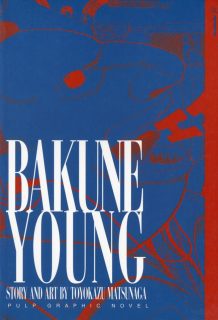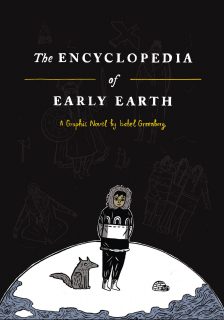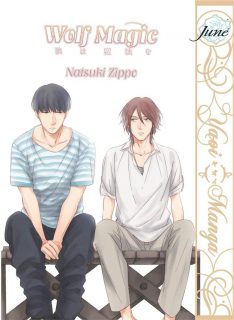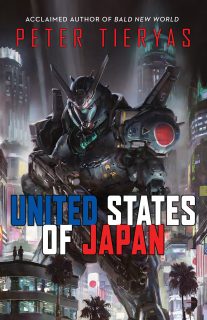My News and Reviews
The end of the month is approaching which means it’s time for Experiments in Manga’s monthly giveaway. The winner of the most recent giveaway will be announced on Wednesday, so there’s still a little time left to enter for a chance to win the first volume of Kenya Suzuki’s delightful full-color manga series Please Tell Me! Galko-chan. Speaking of manga giveaways, there’s also an opportunity to win a copy of the first omnibus in Kei Sanbe’s Erased over at The OASG.
Elsewhere online, I came the Young Adult Library Services Association’s 2017 Great Graphic Novels for Teens. As usual, the list includes a fair number of manga along with all of the other excellent comics. Ichigo Takano’s Orange (which was also one of my notable manga from 2016) even made the top ten list. Out of the many other manga included as part of YALSA’s larger list, I have in-depth reviews of Junji Ito’s Cat Diary: Yon & Mu and Akiko Higashimura’s Princess Jellyfish, Omnibus 1, both of which I loved.
Another list I came across recently was BookRiot’s feature on Japanese speculative fiction in translation. Overall, I think it’s a great list–I’ve previously reviewed three of the books included (Miyuki Miyabe’s The Book of Heroes, Yusuke Kishi’s The Crimson Labyrinth, and Taiyo Fujii’s Gene Mapper) and most of the others I’ve been meaning to read for quite some time or were already high on my list of books to read in the near future.
It’s been a while since I’ve mentioned Kickstarter projects here, but there are a few campaigns for print comics that have caught my eye lately: Maya Kern is looking to print the second volume of the adorable webcomic Monster Pop; Amanda Lafrenais is campaigning to release the second Titty-Time print collection of erotic comics; and Deandra Tan is hoping to release a print edition of her graphic novel Love Debut!.
Quick Takes
 Aoharu X Machinegun, Volume 1 by Naoe. I picked up the first volume of Aoharu X Machinegun more on a whim than anything else but I ended up enjoying it much more than I expected. On the surface there are a few things about the beginning of Aoharu X Machinegun that are oddly reminiscent of Ouran High School Host Club–Masamune works in a host club and Hotaru, who is often mistaken for a boy, gets wrapped up in his schemes after she needs to earn some money for damaging the club’s property–but the similarities mostly end there. Hotaru has an overly-strong sense of of justice and has a tendency to get into fights because of it. Masamune is the leader of a competitive survival/war game team and has decided the Hotaru should become its third member after her aggressiveness leaves a distinct impression on him. Initially, the team’s second member Tooru, who also happens to be well-known hentai mangaka, is less than thrilled about this. They’re both completely unaware that Hotaru is a girl, too, which could cause some trouble later on. Aoharu X Machinegun is kind of ridiculous but fun. I enjoyed its action and sense of humor and this point would be interested in reading more.
Aoharu X Machinegun, Volume 1 by Naoe. I picked up the first volume of Aoharu X Machinegun more on a whim than anything else but I ended up enjoying it much more than I expected. On the surface there are a few things about the beginning of Aoharu X Machinegun that are oddly reminiscent of Ouran High School Host Club–Masamune works in a host club and Hotaru, who is often mistaken for a boy, gets wrapped up in his schemes after she needs to earn some money for damaging the club’s property–but the similarities mostly end there. Hotaru has an overly-strong sense of of justice and has a tendency to get into fights because of it. Masamune is the leader of a competitive survival/war game team and has decided the Hotaru should become its third member after her aggressiveness leaves a distinct impression on him. Initially, the team’s second member Tooru, who also happens to be well-known hentai mangaka, is less than thrilled about this. They’re both completely unaware that Hotaru is a girl, too, which could cause some trouble later on. Aoharu X Machinegun is kind of ridiculous but fun. I enjoyed its action and sense of humor and this point would be interested in reading more.
 Bakune Young, Volumes 1-3 by Toyokazu Matsunaga. I’ve been meaning to read Bakune Young for quite a while now but the short series is long out-of-print and can be somewhat difficult to find. (Fortunately, it turned out that my library actually owns a complete set.) Reading Bakune Young is quite an experience to say the least. Matsunaga’s artwork, while it’s frequently and deliberately grotesque and at times could even be described as ugly, is tremendous. The story itself is nearly nonsensical, but it does manage to have a bizarre sort of logic to it. The series opens with the titular Bakune Young in a pachinko parlor before he begins targeting yakuza in a killing spree. His rampage quickly escalates and eventually not only the yakuza, but Japanese police, a ninja assassin from the French Foreign Legion, psychics, and even the American military all become involved as the death count increases exponentially. Bakune Young is certainly not for the faint of heart. It’s incredibly violent, viciously dark, and legitimately absurd, but assuming one isn’t bothered by all that, it can also be extraordinarily funny. I suspect Bakune Young is a manga that readers either love or hate without there being much middle ground.
Bakune Young, Volumes 1-3 by Toyokazu Matsunaga. I’ve been meaning to read Bakune Young for quite a while now but the short series is long out-of-print and can be somewhat difficult to find. (Fortunately, it turned out that my library actually owns a complete set.) Reading Bakune Young is quite an experience to say the least. Matsunaga’s artwork, while it’s frequently and deliberately grotesque and at times could even be described as ugly, is tremendous. The story itself is nearly nonsensical, but it does manage to have a bizarre sort of logic to it. The series opens with the titular Bakune Young in a pachinko parlor before he begins targeting yakuza in a killing spree. His rampage quickly escalates and eventually not only the yakuza, but Japanese police, a ninja assassin from the French Foreign Legion, psychics, and even the American military all become involved as the death count increases exponentially. Bakune Young is certainly not for the faint of heart. It’s incredibly violent, viciously dark, and legitimately absurd, but assuming one isn’t bothered by all that, it can also be extraordinarily funny. I suspect Bakune Young is a manga that readers either love or hate without there being much middle ground.
 The Encyclopedia of Early Earth by Isabel Greenberg. I recently read and absolutely loved Greenberg’s The One Hundred Nights of Hero and so immediately made a point to seek out more of her work. The Encyclopedia of Early Earth was Greenberg’s first graphic novel and received great acclaim when it was published. The comic’s premise is simple: a nameless storyteller as travels the world in search of a missing piece of his soul. The graphic novel shares some obvious similarities to The One Hundred Nights of Hero in its structure, themes, artwork, and setting. Both comics take place in the pre-prehistoric Early Earth and utilize the same mythologies, cosmologies, and pantheons. Both comics, in addition to love, are also about the importance of stories and storytellers; they find inspiration in and retell existing folktales while intertwining them with those of Greenberg’s own making. Otherwise, the two comics aren’t directly related. The Encyclopedia of Early Earth feels less politically-charged than The One Hundred Nights of Hero which may make it more palatable to some audiences but as a result it isn’t nearly as powerful a work overall in comparison. Even so, The Encyclopedia of Early Earth is wonderful.
The Encyclopedia of Early Earth by Isabel Greenberg. I recently read and absolutely loved Greenberg’s The One Hundred Nights of Hero and so immediately made a point to seek out more of her work. The Encyclopedia of Early Earth was Greenberg’s first graphic novel and received great acclaim when it was published. The comic’s premise is simple: a nameless storyteller as travels the world in search of a missing piece of his soul. The graphic novel shares some obvious similarities to The One Hundred Nights of Hero in its structure, themes, artwork, and setting. Both comics take place in the pre-prehistoric Early Earth and utilize the same mythologies, cosmologies, and pantheons. Both comics, in addition to love, are also about the importance of stories and storytellers; they find inspiration in and retell existing folktales while intertwining them with those of Greenberg’s own making. Otherwise, the two comics aren’t directly related. The Encyclopedia of Early Earth feels less politically-charged than The One Hundred Nights of Hero which may make it more palatable to some audiences but as a result it isn’t nearly as powerful a work overall in comparison. Even so, The Encyclopedia of Early Earth is wonderful.
 Wolf Magic by Natsuki Zippo. So far, Wolf Magic is the only manga by Zippo to have been released in English. As far as I can tell, Wolf Magic is also Zippo’s first professional work. Especially considering that, it’s a very strong collection of boys’ love manga, and I’d certainly be interested in seeing more from Zippo translated. Wolf Magic opens with “The Water of Love for the Withered Flower” which is about Hanasaki, a florist whose severe appearance is at complete odds with what most people would associate with his profession. However, he still manages to unintentionally catch the eye of Hata. The manga then turns to the various “Wolf Magic” stories which follow Nagase, a young gay man, as he falls in and out of love during high school and then continues to look for “the one” in college. In the process, he develops a surprising relationship with Higuchi. While the two story arcs are unrelated and are quite different from each other, thematically they are very similar. Both Hanasaki and Nagase are searching for love and acceptance and both ultimately find it in unexpected places and ways. Overall, with its attractive artwork and excellent characterizations, Wolf Magic is quite well done.
Wolf Magic by Natsuki Zippo. So far, Wolf Magic is the only manga by Zippo to have been released in English. As far as I can tell, Wolf Magic is also Zippo’s first professional work. Especially considering that, it’s a very strong collection of boys’ love manga, and I’d certainly be interested in seeing more from Zippo translated. Wolf Magic opens with “The Water of Love for the Withered Flower” which is about Hanasaki, a florist whose severe appearance is at complete odds with what most people would associate with his profession. However, he still manages to unintentionally catch the eye of Hata. The manga then turns to the various “Wolf Magic” stories which follow Nagase, a young gay man, as he falls in and out of love during high school and then continues to look for “the one” in college. In the process, he develops a surprising relationship with Higuchi. While the two story arcs are unrelated and are quite different from each other, thematically they are very similar. Both Hanasaki and Nagase are searching for love and acceptance and both ultimately find it in unexpected places and ways. Overall, with its attractive artwork and excellent characterizations, Wolf Magic is quite well done.
 United States of Japan by Peter Tieryas. I’ve often heard United States of Japan described as a spiritual sequel or successor to Philip K. Dick’s The Man in the High Castle. In some ways that is certainly true–Tieryas’ novel probably would not have existed were it not for Dick’s and makes multiple references to The Man in the High Castle–but the two novels are drastically different from each other in tone and style. The underlying premise, however, is the same. Emerging victorious from World War II, Japan now controls a significant portion of what was once the United States of America. The grim cyberpunk alternate history presented in United States of Japan (complete with mecha battles and graphic torture) can be extraordinarily brutal and gruesome. The lead characters aren’t exactly the most likeable or sympathetic people, either, though they become slightly more so as the novel progresses. Captain Ben Ishimura, whose only talent seems to be hacking and programming, is a censor who comes to the attention of Agent Akiko Tsukino when an illegal video game which imagines America winning the Second World War threatens to embolden resistance against the rule of Japan.
United States of Japan by Peter Tieryas. I’ve often heard United States of Japan described as a spiritual sequel or successor to Philip K. Dick’s The Man in the High Castle. In some ways that is certainly true–Tieryas’ novel probably would not have existed were it not for Dick’s and makes multiple references to The Man in the High Castle–but the two novels are drastically different from each other in tone and style. The underlying premise, however, is the same. Emerging victorious from World War II, Japan now controls a significant portion of what was once the United States of America. The grim cyberpunk alternate history presented in United States of Japan (complete with mecha battles and graphic torture) can be extraordinarily brutal and gruesome. The lead characters aren’t exactly the most likeable or sympathetic people, either, though they become slightly more so as the novel progresses. Captain Ben Ishimura, whose only talent seems to be hacking and programming, is a censor who comes to the attention of Agent Akiko Tsukino when an illegal video game which imagines America winning the Second World War threatens to embolden resistance against the rule of Japan.